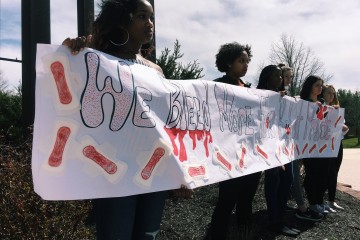Student Voter Empowerment Act Would Make FSU a Polling Place
The Student Voter Empowerment Act, a bill designed to increase student voter registration and turnout that would affect Frostburg State University, is before the Maryland State Senate today in Annapolis. The hearing began at 1:00 p.m.
The bill, SB-647, seeks to require the State Board of Elections to maintain a webpage with clear information about voter registration for students enrolled in college, including links to information on voting by absentee ballot for students outside of the state. It also seeks to require each institution in the University of Maryland system to designate a staff member as the “student voting coordinator” who will develop and implement a plan to increase student voter registration.
Most importantly, the Student Voter Empowerment Act would require all institutions of higher education with an enrollment of 4,500 or more students, whether private or public, to become a polling place in the 2022 election. This includes Frostburg State University.
House Majority Leader, Eric Leudtke (D), is a professor at the University of Maryland, College Park. Following the 2016 election, he says “multiple brilliant students” asked him to improve student access to voting by making their institutions a designated polling place. In response, Leudtke designed the Student Voter Empowerment Act with the support of Sam Novey of Mile 22. Novey started the TurboVote college partnership program in 2012.
According to Rishi Shah, the democracy associated with Maryland PIRG, a non-profit public interest advocacy organization, “this legislation is critical because of the low levels of voter participation among young people.”
In 2018, national turnout for young people was just 36% compared to over 50% of other voter demographics.
Maryland PIRG cites studies that show that voting is habit-forming, thus “a lower voter turnout among young people signals a decline in cover and civic participation not just now, but in the years and decades to come,” says Shah.
Moreover, “as new voters, young people often struggle to navigate the voter registration system,” says Shah.
Therefore, those in support of the Student Voter Empowerment Act say the solution is simple; because universities seek to educate, they can play an important role in ensuring eligible students are civically educated.
Shah and Mile 22 say there is bipartisan support for this legislation. Specifically, Senator Clarence K. Lam and Luedtke’s support has been essential to the process, says Shah.
For those interested in writing letters to your delegates on this issue, or any other, please find your representative here: http://myreps.datamade.us/
The Office of Civic Engagement at FSU has offered to assist students in providing testimony and writing letters to representatives. They also hold events throughout the semester, including debate watch parties and the Times Talk Thursday series. You can find out more here.
The Bottom Line will continue to monitor the progress of the Student Voting Empowerment Act and provide updates.



